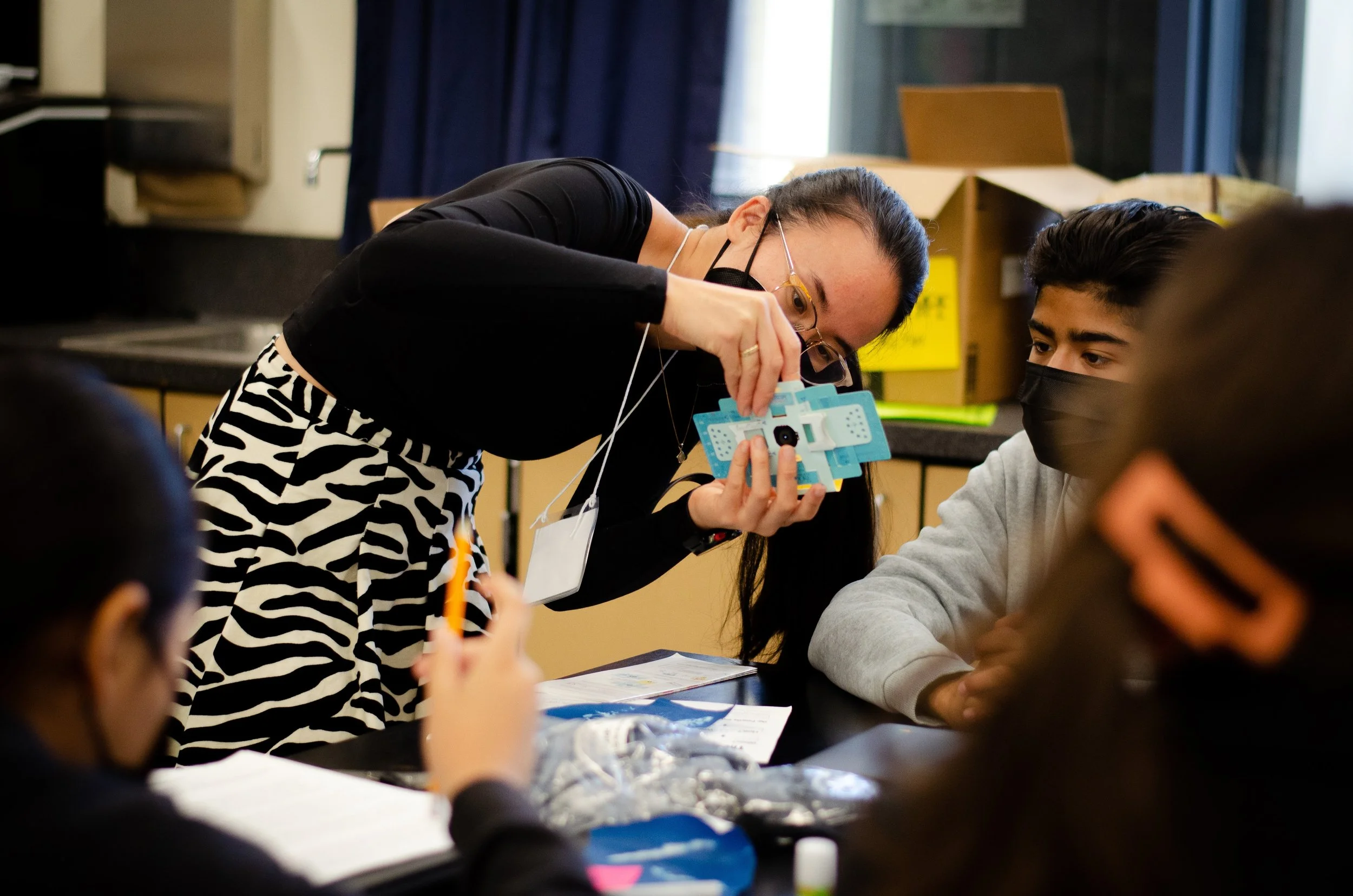Teaching & co-learning
Teaching a teen how to assemble a foldable paper microscope (Foldscope) at BioJam Camp 2021.
Learning is transformational.
As an instructor and co-learner, I am passionate about amplifying cultural knowledge, lived experience, and art into conversations about science.
I have science teaching experience in both formal (classroom) education spaces, as well as a variety of informal spaces. I have been a lecturer in the Department of Biology at Stanford University (2023) and certified substitute teacher in the state of California (2023-2024). My informal teaching experiences includes STEAM bio-art workshops for high school students, scientific illustration workshops for graduate students, science summer camps for elementary school students (Camp Galileo) and high school students (BioJam camp), and debate camp and debate coaching for high school students.
Teaching in Formal Education Spaces
I have been a lecturer and course co-developer for introductory lab and lecture courses, as well as upper-division courses at Stanford University and the University of Michigan. I also have also taken three university courses in STEM pedagogy and teaching, which has informed my active learning approaches in the classroom.
Introduction to Ecology and Evolution (Undergraduate lab course)
Stanford University, Stanford CA
At Stanford, I was a lecturer and formerly, graduate teaching assistant for Introduction to Research in Ecology and Evolutionary Biology (BIO 47, formerly called BIO 44Y). This undergraduate course incorporates ongoing research in our laboratory into a dynamic, course-based undergraduate research experience (CURE). Students use the a nectar microbe system to pursue original lab and field research at Stanford's Jasper Ridge Biological Preserve. The course was awarded a teaching prize by the American Association for the Advancement of Science (AAAS). In spring of 2019, I developed a new module for the course where students studied eco-evolutionary dynamics in the nectar microbe metacommunity using experimental evolution coupled with competition experiments. This module differed from previous years because students were able to develop hypotheses, test them in the lab, and analyze their results within five weeks of the course. These laboratory experiments worked well with the field work and analysis of a ten-year dataset collected by students. During spring of 2020, I was involved in helping the course pivot to online instruction and created an extensive set of programming videos for students. As a graduate student, I was awarded the Frances Lou Kallman Award for outstanding service to the department in teaching and research. In spring of 2023, I was hired to teach the course as a lecturer.
Introduction to Molecular, Cellular, & Developmental Biology
Upper Division Molecular Biology (Undergraduate lecture courses)
University of Michigan, Ann Arbor MI
At the University of Michigan, I was a graduate student instructor for Introductory Molecular, Cellular, & Developmental Biology (BIOLOGY 172) and upper-level Molecular Biology (MCDB 427). Teaching BIOLOGY 172, I utilized historical examples, quirky YouTube videos (for example, using packed Japanese subway cars to represent the proton motive force), and pictures from adventures in the Ann Arbor area to illustrate the beauty and relevance of biology to introductory students. As a co-instructor for MCDB 427, an upper level molecular biology course, I redesigned the previously lecture-dominated curriculum to incorporate active learning through creating a collection of flipped classroom videos. I also redesigned the discussion sections for students to create a series of study materials including YouTube videos, practice exam questions, written summaries, and class presentations.
YouTube banner image for MCDB 427's channel.
Experience in Informal Education Spaces
Supporting a teen showing his mini Milpa hydrogel root ecosystem for a local news team at BioJam Camp 2023. Watch the clip here.
Outside the classroom, I have taught numerous camps, workshops, and coached winning teams at the intersection of science, art, and policy.
My teaching style centers active learning, culturally-relevant pedagogy, and art. Teaching activities I have led have included:
Solarpunk readings, followed by an Indigenous futurism visioning exercise and AI-assisted art creation.
Land-based storytelling accompanying a plant-walk to collect speciems for the creation of large cyanotype sunprint tapestry of local plants. Participants went swimming in a lake to wash the sunprints to create the final art pieces.
Using flash-frozen foods to create vacuum-formed buck “molds”, which were filled with sterilized waste substrates inoculated with reishi mycelium to grow mushroom-based sculptures.
Science/Art Workshops
I have taught many workshops on the topic of science and art. At Stanford University and other institutions, I’ve taught several workshops for graduate scientists about graphic design. I also take these activities into community and teach a variety of art-based science activities for high school students as part of BioJam Camp.
Science Camp
I’ve been the lead or co-instructor for two different youth science summer camps, Camp Galileo (3-4th grade classroom) and BioJam Camp (8-12th grades). In both programs, I implemented and delivered STEAM programming that centered experiential learning, design thinking, and rapid prototyping.
Policy Debate
As the lead debate coach for Gulliver Schools, I worked closely with nationally-competitive high school debaters. Debaters I have coached have won national championships and competed at the highest levels, both on the novice, junior varisity, and varsity levels. In addition, I am the founder of Go, Fight, Win Novice Debate, a free online curriculum for novice policy debaters.











